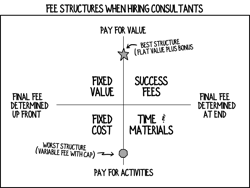Paying for Year-End Help Without Getting Ho-Ho-Hosed
With the year quickly clicking down, it’s time to carefully evaluate whether you should spend the cash remaining in the budget on a project or return the funds to corporate. Okay, that took about two seconds. Of course you’ll spend the money. For instance, you could hire that big fellow from the North Pole who claims to be an expert in rapid product distribution. The next dilemma is tougher to navigate.
Experience has taught you that hiring an outside expert – an agency or consultant or engineer or any other third party – often works as well as beer in eggnog. The result’s disappointing and you’re left with a bad taste in your mouth. While returning money to the corporate coffers ranks up there with coal in your Christmas stocking, wasting money can put you on Santa’s naughty list in indelible ink. Is there a way to hire and pay experts that increases the odds of a happy new year?
Of course there is. Elsewhere you can read about best practices for hiring experts (see this article). For the moment let’s just discuss compensation. The traditional way to pay Santa is with cookies left on the mantle. The more deliveries St. Nick makes, the more cookies he earns. That’s pretty much how consultants are typically paid too. Each day of work the consultant delivers is rewarded with a day’s fees. That’s a very common approach, and also dumber than traction control on a sleigh.
There’s no value to you in an additional day of consulting work. BigElf Consulting could work 364 days on your distribution project, but that doesn’t make it more valuable to you than if they delivered the solution in 64 days or six days. So, why would you pay them more? “Oh ho!” you exclaim. “I’m smarter than that. I limit the number of cookies… er… amount of fees by setting a cap.” Alas, that turns out to be a bad fee structure too. In fact, paying your expert an hourly, daily or weekly rate with a cap or limit is the worst possible fee structure.
How should you compensate your jolly, outside expert? Partly a flat fee based on the anticipated value of the project and partly a success fee based on the actual outcome. Your contract with BigElf should stipulate that Santa gets paid two cookies at the start of the project and an extra four cookies if you implement the distribution system he recommends. (Flying reindeer sound fishy to me, but if the high-altitude cervine approach works, who am I to argue?)
The diagram below outlines the different fee structures you could use in your consulting contracts:
Picking a metric of success is even easier. Choose something binary and obvious. Like, say, whether or not you take the next step (if you do, the first step with the consultant must have been successful) or whether or not you implement the consultant’s recommendation (if you do, the advice must be at least somewhat good) or whether or not you watch "A Charlie Brown Christmas" with the consultant (if you do, the consultant shares your fine appreciation for classic cinema).
Of course you’re going to spend every dollar in your budget before the fiscal cycle ends, but don’t get caught in the cookies-at-the-fireplace trap. Pay for the consultants you hire on a value-plus-bonus basis and enjoy the gift of outstanding results from your end-of-the-year projects.
David A. Fields, author of The Executive’s Guide to Consultants (McGraw Hill, 2012) improves companies’ success with outside experts. Read an overview of his advisory service or contact him by e-mail at [email protected].
About the Author
David A. Fields
Managing Director
David A. Fields is a speaker, author and the founder and managing director of The Ascendant Consortium, a unique organization specializing in maximizing the ROI from consulting engagements. He is the author of "The Executive's Guide to Consultants" (McGraw-Hill, 2012). He writes monthly columns for IndustryWeek and Consulting Magazine, and his commentary has appeared in USA Today, CNN Money, Investor’s Business Daily, Advertising Age, BusinessWeek, SmartMoney, and other publications.

